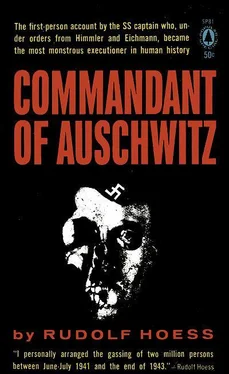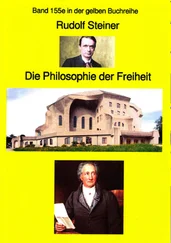During the period when the fires were kept burning continuously, without a break, the ashes fell through the grates and were constantly removed and crushed to powder. The ashes were taken in trucks to the Vistula, where they immediately drifted away and dissolved. The ashes taken from the burning pits near bunker II and crematorium IV were dealt with in the same way.
The process of destruction in bunkers I and II was exactly the same as in the crematoriums, except that the effects of the weather on the operation were more noticeable.
The whole of the work in connection with the extermination process was performed by special detachments of Jews.
They carried out their grisly task with dumb indifference. Their one object was to finish the work as quickly as possible so that they could have a longer interval in which to search the clothing of the gassed victims for something to smoke or eat. Although they were well fed and given many additional allowances, they could often be seen shifting corpses with one hand while they gnawed at something they held in the other. Even when they were engaged in the most gruesome work of digging out and burning the corpses buried in the mass graves they never stopped eating.
Even the cremation of their near relations failed to shake them.
When I went to Budapest in the summer of 1943 and called on Eichmann, he told me about the further actions which had been planned in connection with the Jews.
At that period there were rather more than 200,000 Jews from the Carpathio-Ukraine, who were detained there and housed in some brickworks, while awaiting transport to Auschwitz.
Eichmann expected to receive from Hungary, according to the estimate of the Hungarian police, who had carried out the arrests, about 3,000,000 Jews.
The arrests and transportation should have been completed by 1943, but because of the Hungarian government’s political difficulties, the date was always being postponed.
In particular the Hungarian army, or rather the senior officers, were opposed to the extradition of these people and gave most of the male Jews a refuge in the labor companies of the front-line divisions, thus keeping them out of the clutches of the police. When in the autumn of 1944, an action was started in Budapest itself, the only male Jews left were the old and the sick.
Altogether there were probably not more than half a million Jews transported out of Hungary.
The next country on the list was Romania. According to the reports from his representative in Bucharest, Eichmann expected to get about 4,000,000 Jews from there.
Negotiations with the Romanian authorities, however, were likely to be difficult. The anti-Semitic elements wanted the extermination of the Jews to be carried out in their own country. There had already been serious anti-Jewish rioting, and abducted Jews had been thrown into the deep and isolated ravines of the Carpathians and killed. A section of the government, however, was in favor of transporting unwanted Jews to Germany.
In the meantime Bulgaria was to follow with an estimated two and a half million Jews. The authorities there were agreeable to the transport, but wanted to await the result of the negotiations with Romania.
In addition, Mussolini was supposed to have promised the extradition of the Italian Jews and those from the Italian occupied part of Greece, although not even an estimate had been made of their numbers. But the Vatican and the royal family, and consequently all those opposed to Mussolini, wanted at all costs to prevent these Jews from being surrendered.
Eichmann did not count on getting these Jews.
Finally there was Spain. Influential circles were approached by German representatives over the question of getting rid of the Jews. But Franco and his followers were against it. Eichmann had little faith in being able to arrange for an extradition.
The course taken by the war destroyed these plans and saved the lives of millions of Jews.
Rudolf Hoess Cracow November 1946
APPENDIX 2
My meetings with Himmler
I already knew the Reichsführer SS, Heinrich Himmler, slightly during the years 1921 and 1922, when, as courier of my Freikorps I had a great deal to do with Ludendorff. General Ludendorff was the protector and secret head of all the nationalist movements with their disguised military or semi-military organizations, which were forbidden by the peace treaty. Himmler was also a member of a Freikorps in Bavaria and it was in LudendorfPs house that I got to know him.
Later on, in 1930, at an assembly of the Artamanen in Saxony (Himmler belonged to the association as Gauführer of Bavaria), I became more closely acquainted with him….
In 1940 Himmler suddenly arrived in Sachsenhausen concentration camp. Shortly before he reached the guard, he met a detachment of prisoners who passed him leisurely pulling a trolley. Neither the sentry nor the prisoners recognized the Reichsführer SS sitting in his car, and therefore did not take off their caps. Himmler drove past the guard and went straight to the protective custody camp. As I was just on the point of going into the camp (I was commander of the protective custody camp at the time), I was able to report to him at once on behalf of the camp. He was very irritated and his first question, after giving a curt greeting, was, “Where is the commandant?” After some time, the commandant, Sturmbannführer Eisfeld, appeared on the scene, but meanwhile Himmler had already entered the protective custody camp, snapping angrily that he, Himmler, had up to then been accustomed to another kind of discipline in the concentration camps, and that apparently prisoners were no longer required to salute.
He refused to listen to the commandant’s explanation and exchanged no further words with him. He made a brief inspection of the detention block, where some special prisoners had been placed, and then immediately drove off again. Two days later Eisfeld was dismissed from his position as commandant of Sachsenhausen and Oberführer Loritz (formerly commandant of Dachau and then section leader of the General SS in Klagenfurt) was recalled to concentration camp service to replace him. Himmler had previously removed Loritz from Dachau because he was too severe with the prisoners, and also because he had not concerned himself sufficiently with the affairs of the camp.
In 1942 Loritz was once again, on the same grounds, removed from Sachsenhausen on Pohl’s suggestion….
My personal meetings with Himmler during my membership in the SS were as follows:
In June 1934, during an inspection of the Pomeranian SS, Himmler asked me whether I would like to join the active SS in a concentration camp. It was only after much deliberation with my wife (for we wanted to settle on the land) that I agreed to do this, because I wanted to be on active service once more. On December 1, 1934, I was summoned to Dachau by the Inspector of Concentration Camps, Eicke.
In 1936 Himmler held a grand inspection of the whole SS organization, including that of the concentration camp in Dachau, at which all Gauleiters, Reichsleiters, and all SS and SA Gruppenführer were present. I was Rapportführer at that time and deputized for the commander of the protective custody camp, who was absent. Himmler is in the best of spirits because the whole inspection has gone off without a hitch. The Dachau concentration camp is also going well at that moment. The prisoners are well fed, clean, and well clothed and housed. Most of them are busy in the workshops and the number of sick is hardly worth mentioning. The total strength of about 2,500 is accommodated in ten brick-built huts. The sanitary arrangements are ample. There is a plentiful supply of water. Underwear is changed once a week and bed linen once a month. One-third of the complement consists of political prisoners and two-thirds of professional criminals, asocials and forced labor prisoners, homosexuals and about 200 Jews.
Читать дальше












